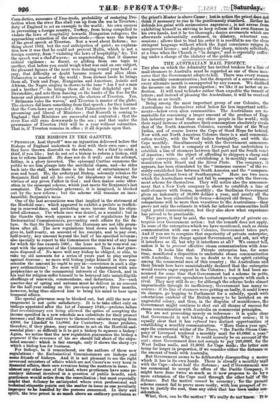ITIE BISHOPS IN THE GAZETTE.
" Pursiesess heal thyself" was an injunction delivered before the Bishops of England undertook to deal with their own case ; and they have thrown discredit on the rebuke. Set a thief to catch a thief, if you like ; but do not set a bishop to reform a bishop, still less t6 reform himself. He does not do it well; and the attempt, failing, is a glory inverted. The episcopal Curtius summons the public to see him plunge into the sacrificial chasm, and—he rides back into the stall, where there is the best of entertainment for man and beast. He, the archetypal Bishop, solemnly rebukes Sir Benjamin Hall and all his crew, for blasphemy in denying the virtues of any given Father in God ; and then makes some alter- ation in the episcopal scheme, which just meets Sir Benjamin's last complaint. The particular grievance, it is imagined, is blocked out by the new reform ; but the scheme still remains an inex- haustible Benjamin's mess. One of the last accusations was that implied in the statement of the Horfield ease; which appeared to exhibit a prelate as traffick- ing in renewal-fines, and pocketing more income than his stipu- hrted allowanoe. The whole ease was denied, as a scandal; bat in the Gazette this week appears a new set of regulations by the Ecclesiastical Commissioners, preventing such affairs for the fu- ture. So that Sir Benjamin and Mr. llorsman are not idle grum- blers after all. The new regulations bind down each bishop to give in, half-yearly, an account of his receipts, and to pay over, half-yearly, any amount beyond the half of his specified revenue; also specially to report to the Commission the renewal of any lease for which the fine exceeds 1001.; the lease not to be renewed ex- cept with the approval of the Commissioners. Thus is that griev- ance disposed oL No more will any bishop be obliged, or able, to rake up old accounts for a series of years past to play surplus against decrease ; no more will bishop judge himself in foro con- scientise the amount he ought to pay in—conscience is such a slip- pery arithmetician! No more will he be embarrassed with nioe perplexities as to the commercial interests of the Church, and in his zeal for religion suffer himself to be betrayed into unintelligible shuffiings of renewals, eommendams, and inductions. No—each quarter-day of spring and autumn must he deliver in an account for the half-year ending on the previous quarter; three months, however, being thus allowed him to bring his mind to bear upon temporal affairs.
The special grievance may be blocked out, but still the new ar- rangement is not quite satisfactory. It is to take effect only en bishops appointedsafter the lat of January 1848,—prelates before that revolutionary tera being allowed the option of accepting the income specified in a new schedule ass substitute for their present incomes; and they still reserve to themselves salaries ranging from 4200/. for Llandaff to 15,000/. for Canterbury. Some prelates, therefore, if they please, may continue to act on the Hod:mid-and- scandal plan so difficult is it to get a bishop to squeeze a bishop ! Again, we notice that the new regulation guarantees the bishop a payment if the revenues of his see should fall short of the stipu- lated amount: which is fair enough, only it shows the sharp eye which a bishop has for business.
For bishops, be it remembered, are the authors of these new regulations : the Ecclesiastical Commissioners are bishops and some friends of bishops. And it is not pleasant to see the right
reverend ministers of affairs which are not (loser's so very keen in financial affairs, their own revenues being the matters in issue. In almost any other case of the kind, where gentlemen have some pe- cuniary interest involved in a question of public benefit, such gentlemen would retire from the consultation ; but most especially might that delicacy be anticipated where even professional and technical etiquette points out the matter in issue as one peculiarly improper to be handled by the persons concerned. In duty and spirit, the true priest is as much above an ordinary gentleman as thepriest's Master is above Cesar ; butin aceson the piest diesnai. think it necessary to rise to the gentleman/y standard, Anther he defends his gams with acrimonious eagerness ; is not averse from eshibiting himself as striving to keep reform of his own finance in his own hands, lest it be too thorough; denies averments which are afterwards substantially confessed, in dilatory, reluctant con- cessions ; allows that to bind his order it is needful to use the close stringent language without which the legal conscience ranges in unreproved licence; • and displays all this sharp, minute solicitude, at a time when the Church is "in danger," and is especially suffer- ing under a charge of the idolatry of the golden caLL


























 Previous page
Previous page